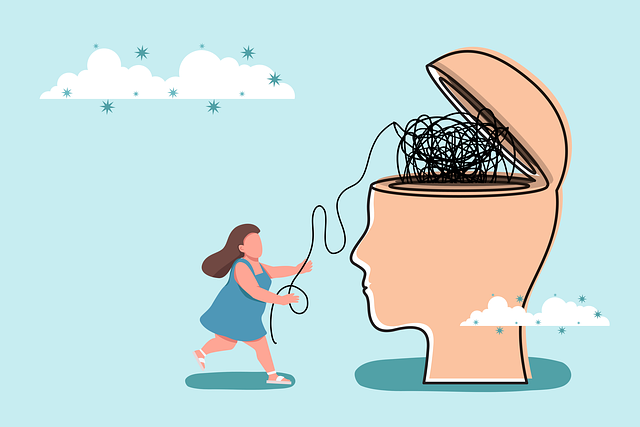Stress, a complex response to internal or external triggers, significantly impacts both mind and body. Cognitive Behavioral Therapy (CBT) effectively manages stress by challenging negative thought patterns and behaviors, reducing its impact on mental and physical health. CBT helps individuals identify cognitive distortions like all-or-nothing thinking and catastrophizing, replacing them with positive affirmations for better emotional well-being. Through techniques like cognitive restructuring, mindfulness exercises, and behavioral activation, CBT equips people with coping strategies to adaptively respond to stressful situations, fostering a sense of control and reducing overwhelming feelings. Incorporating mindfulness into daily routines further enhances these benefits, making CBT a powerful therapy for stress management that offers personalized insights compared to self-help methods.
Stress is an inevitable part of life, but managing it effectively can significantly impact our mental and physical well-being. This article explores cognitive strategies for stress management, delving into techniques like Cognitive Behavioral Therapy (CBT), which helps identify and challenge negative thought patterns. We’ll guide you through reframing thoughts, building coping strategies, integrating mindfulness, and seeking professional support with CBT therapy to navigate life’s challenges with resilience.
Understanding Stress and Its Impact on Mind and Body

Stress is a complex response triggered by various internal or external factors, often characterized by heightened emotions and physical sensations. It has profound effects on both mind and body, impacting our cognitive functions, emotional well-being, and even physiological processes. When we perceive a situation as stressful, our bodies initiate the ‘fight or flight’ response, releasing hormones like cortisol and adrenaline. This natural reaction can be beneficial in short-term scenarios, but prolonged stress can lead to detrimental health issues.
Cognitive Behavioral Therapy (CBT) offers valuable insights into managing stress by challenging negative thought patterns and behaviors. It helps individuals recognize and modify unhelpful cognitive processes that contribute to stress. By learning to identify and reframe distressing thoughts, CBT empowers people to respond to stressful situations more adaptively, reducing the impact of stress on both mental and physical health.
Introduction to Cognitive Behavioral Therapy (CBT)

Cognitive Behavioral Therapy (CBT) is a highly effective mental health treatment approach that focuses on identifying and changing negative thought patterns and behaviors. This evidence-based therapy is centered around the belief that our thoughts, feelings, and actions are interconnected, and by modifying these initial cognitive processes, we can significantly impact our overall well-being. CBT helps individuals recognize and challenge distorted thinking, replacing unhelpful beliefs with more realistic and balanced perspectives.
This therapeutic approach has been extensively studied and proven successful in managing a wide range of issues, including stress, anxiety, depression, and even certain phobias. Through CBT, clients learn valuable coping strategies to manage their symptoms and gain a deeper understanding of the connection between thoughts, emotions, and behaviors. By empowering individuals to take control of their mental health, CBT offers a practical and effective solution for navigating life’s challenges and fostering resilience.
Identifying and Challenging Negative Thought Patterns

Negative thought patterns can significantly contribute to feelings of stress and anxiety. Cognitive Behavioral Therapy (CBT) offers a powerful tool for identifying and challenging these unhelpful thoughts. By recognizing cognitive distortions like all-or-nothing thinking or catastrophizing, individuals can begin to question and reframe their thoughts. For example, instead of thinking “I always fail,” one might challenge this thought with evidence, realizing that while there have been setbacks, successes are also a part of one’s history.
CBT encourages people to replace negative thoughts with more realistic and balanced alternatives. This process involves actively monitoring self-talk and replacing automatic negative thoughts (ANTs) with positive affirmations or alternative interpretations. Over time, this practice can lead to healthier thinking patterns, improved emotional well-being, and enhanced stress management skills.
Reframing Thoughts for a Positive Perspective

Stress often stems from our thoughts and perceptions, so changing the way we think can be a powerful tool to manage it. Cognitive Behavioral Therapy (CBT) is a well-known approach that teaches individuals to identify and challenge negative or distorted thought patterns. By reframing these thoughts, people can gain a more positive perspective, which in turn reduces stress levels.
When faced with stressful situations, CBT encourages individuals to step back and examine their thoughts. They learn to recognize unhelpful cognitive distortions, such as all-or-nothing thinking or catastrophizing, and replace them with more balanced and realistic thoughts. This process enables people to adapt better to challenging circumstances, fostering a sense of control and reducing the overwhelming feelings that can lead to stress.
Building Coping Strategies Through CBT Techniques

Cognitive Behavioral Therapy (CBT) offers powerful tools for building effective coping strategies against stress. By identifying and challenging negative thought patterns, individuals can learn to reframe their perspective on stressful situations. CBT encourages a more balanced and realistic view of challenges, helping people manage their responses rather than avoiding or overreacting. Through this process, individuals gain a sense of control, reducing the overwhelming nature of stress.
Techniques such as cognitive restructuring, mindfulness exercises, and behavioral activation are instrumental in CBT. Cognitive restructuring involves detecting and changing distorted thoughts, replacing them with more adaptive ones. Mindfulness encourages staying present and non-judgmentally aware of thoughts and feelings, fostering a sense of calm. Behavioral activation prompts individuals to engage in activities that promote well-being, thereby reducing stress levels over time.
Integrating Mindfulness into Daily Life

Incorporating mindfulness into daily routines can be a powerful cognitive strategy for stress management, building upon principles often explored in CBT therapy. This involves cultivating present-moment awareness and non-judgmental observation of thoughts and feelings. By practicing mindfulness, individuals can learn to acknowledge stressors without immediately reacting to them, fostering a sense of calm and emotional resilience. Simple techniques like mindful breathing exercises or scanning the body for tension can be seamlessly integrated into daily activities, whether it’s during a short commute or while enjoying a cup of tea.
Mindfulness encourages a more conscious engagement with life, helping individuals detach from negative thought patterns and reducing the impact of stress triggers. Regular practice has been shown to enhance overall well-being and improve coping mechanisms, allowing people to navigate challenging situations with greater equanimity. This cognitive strategy not only benefits mental health but also promotes physical relaxation, making it an accessible and effective tool for managing stress in everyday life.
Seeking Support: Professional Guidance for Effective Stress Management

Stress can be overwhelming, and while many people turn to self-help strategies, seeking professional guidance offers a more tailored and effective approach to managing stress. Cognitive Behavioral Therapy (CBT) is a widely recognized and powerful tool in this domain. CBT focuses on identifying and changing negative thought patterns and behaviors that contribute to stress and anxiety. Through collaborative work with a qualified therapist, individuals learn valuable coping mechanisms and gain insights into their unique stress triggers.
By engaging in CBT therapy, one can develop personalized strategies to challenge unhelpful thoughts, regulate emotions, and change behaviors. This process empowers individuals to effectively navigate stressful situations, fostering resilience and improved overall well-being. Accessing professional support is a proactive step towards taking control of one’s mental health and cultivating sustainable stress management skills.
